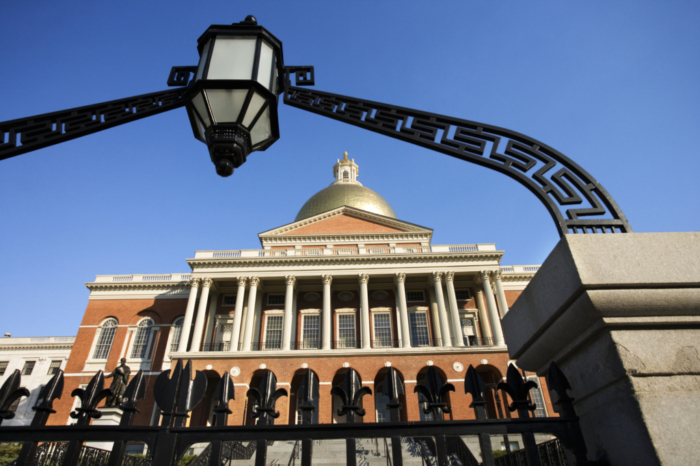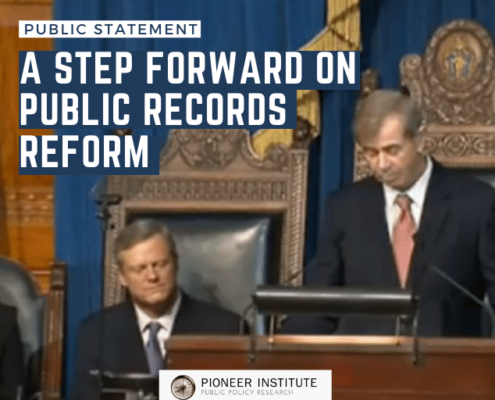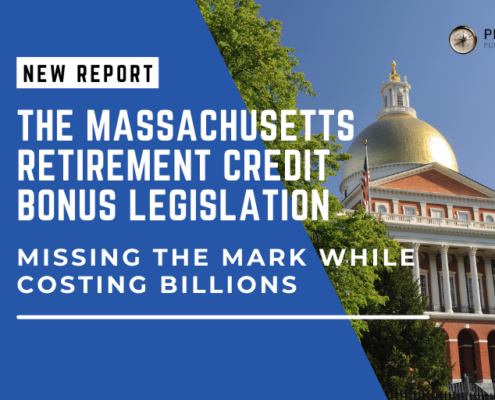Public Statement on the MA Legislature’s Blanket Pension Giveaway
Beacon Hill just put on full display what happens when it is awash in money.
On its face, House Bill 2808, otherwise called “An Act relative to providing a COVID-19 retirement credit to essential public workers,” sounds reasonable. It calls for adding three years of additional retirement credit to state “employees who have volunteered to work or have been required to work at their respective worksites or any other worksite outside of their personal residences during the COVID-19 state of emergency…”
But upon reading the brief bill, it quickly becomes clear that this legislation is irresponsible in the extreme.
Stop the Blanket Pension Giveaway
Get updates from us on this issue.Written so broadly, which public employees aren’t entitled to the benefit?
A closer look shows that the bill defines “employee” as “a person employed by the Commonwealth of Massachusetts” including “its political subdivisions…” As such it also applies to employees of Massachusetts’ municipalities. H.2808 would be a massive unfunded mandate for cities and towns.
And it doesn’t apply just to state and municipal workers who had to actually go into work during the pandemic; they must only have “volunteered to work… at their respective worksites or any worksite outside of their personal residence.” Employees who went in for a single day would also qualify. So do employees who worked from home but one day when the internet was down went to a family member’s home to work. (They meet the provision that you did your job from a “worksite outside of [your] personal residence.”)
Administrators, accountants, techies, teachers, finance officers, grant writers, trash collectors and all those paid with public dollars are potentially in line for the benefit. As currently written, state legislators are eligible to take advantage of the bill. More than half of the Legislature has signed on to H.2808. Support spans the political spectrum. The bill may provide a jump in pension benefits for those employed during the pandemic who have already retired.
A bill in the Massachusetts legislature to reward pandemic workers would add 3 extra years of service to their pensions when they retire, if they worked outside their home sometime between March-Dec. 2020. Do you think legislators & all public employees should be included?
— Pioneer Institute (@PioneerBoston) July 23, 2021
How much will it cost?
At a recent hearing before the Legislature’s Joint Committee on Public Service, the committee’s co-chair, Rep. Ken Gordon, asked H.2808’s House sponsor, Rep. Jonathan Zlotnick of Gardner, whether any analysis had been done on the bill’s fiscal impact. Astonishingly, Zlotnick responded: “The short answer is we don’t have a final number as we sit here today.”
To get a sense of the bill’s impact, Pioneer Institute did an analysis of its effect on a single state employee – UMass President Marty Meehan. Assuming Meehan retires at the end of his current contract in 2025, we project that his annual pension would rise from $287,720 to $335,673 – a $47,953 increase – if H.2808 becomes law. According to actuarial tables, Meehan’s lifetime pension benefit would increase by $790,750.
Pioneer estimates that the bill’s cost would be in the billions of dollars. As of this May, the state pension fund, state Teachers’ Retirement System and the Boston Teachers Retirement system were underfunded by a combined $44 billion. Annual payments to the systems are scheduled to rise from the current $3.1 billion to nearly $12.4 billion over the next 15 years, and would be even higher under H.2808. The bill would also further burden over 100 local pension funds in the Commonwealth, many of which are already woefully underfunded.
What’s next?
The Commonwealth is currently sitting on nearly $10 billion in state surplus and federal COVID relief money. Few would object to using some of that money to benefit state employees who truly put themselves in harm’s way during the pandemic.
The Legislature should demonstrate responsibility and use part of the money to shore up pension funds so the state can fully cover existing commitments to its employees, and pay down what is the highest per capita debt of any state. Such debt reduction could free up hundreds of millions of the over $3.5 billion Massachusetts currently spends each year for debt service.
There are other worthy investments that we should be making, including serious consideration of Governor Baker’s proposals to increase home ownership in economically disadvantaged areas of the state.
H.2808, unfortunately, takes us in exactly the opposite direction. It is absurdly overbroad and solely focused on the public sector. Remember that the public sector did not see employment decrease in any manner similar to the private sector during the pandemic. As such, it is a slap in the face of the tens of thousands of private sector employees who put themselves in harm’s way — or often saw their lives turned upside down by government restrictions, some of which were reasonable, others of which were not at all based in science.
H.2808 is also an abject lesson to taxpayers: This is what happens when the Legislature has access to billions of dollars in excess tax revenue and emergency funds.
Get Updates on Our Pioneer Public Initiatives!
Related Posts












